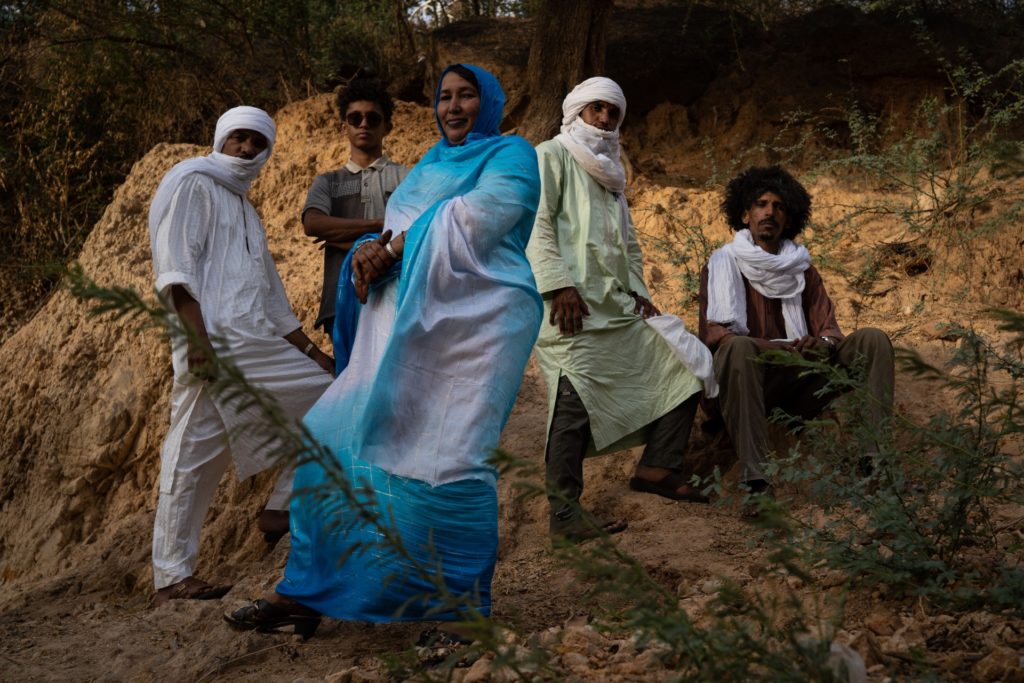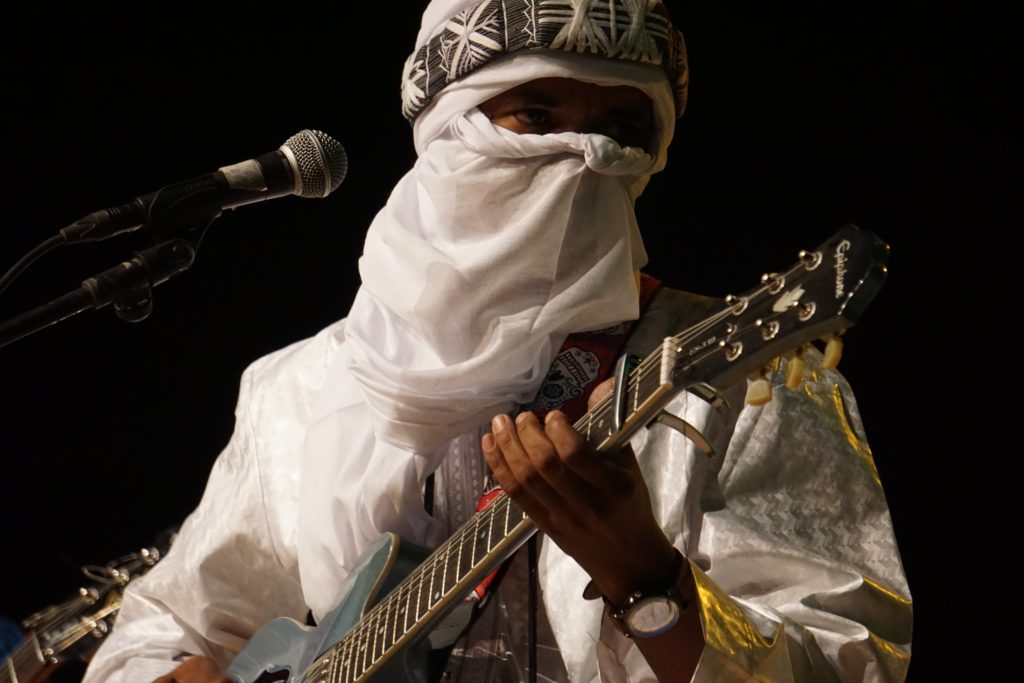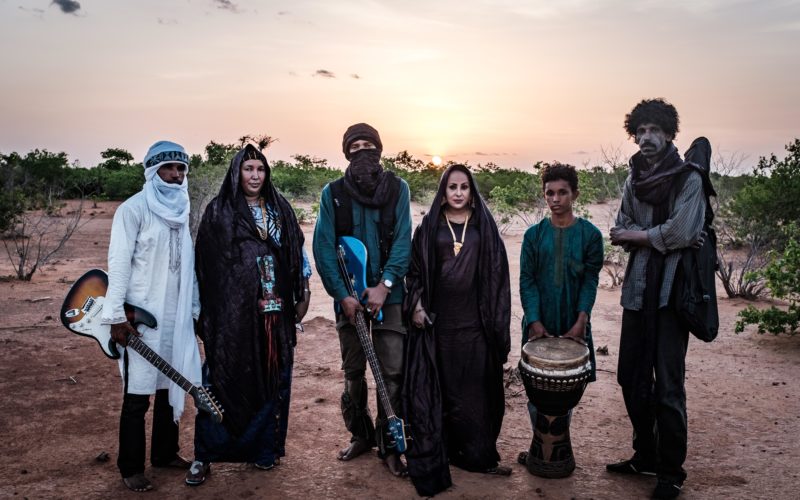The Tuareg band’s new EP Iswat ties together traditional poetic verses and psychedelic desert grooves.
Dag Tenere (“desert’s children” in the Tamasheq language) is a collective of musicians hailing from Burkina Faso, Niger and Mali. I caught up with the band to learn more about them and their new music.
The opening instrumental track Derhanin (trans. My Wish) opens with the steady beat of the djembe drum and the deep hypnotic melody of the electric guitar, welcoming the listener into the Saharan landscape of the assouf.
The band tell me more about their distinctive desert blues sound: “Assouf means nostalgia in Tamasheq […], desert blues is a mixture of traditional and modern, a fusion of rock and blues, but for us it’s simply assouf, a style of music that we identify with that speaks to our hearts, and with which we can express what we feel.”
Their music style blends the expansive rich sounds of the electric guitar with those of percussive traditional Tuareg instruments. An example of this is on Tabsit (trans. Flower/Beloved) where Zaina Aboubacar sings and plays the tende (a goat skin covered drum held together with sticks and strings) and Zaid Ag Abdoul Jamil plays the calabash and the assaqalabo (a type of water drum); while lead singer and guitarist Goumar Abdoul Jamil sings and plays gentle melodies on the electric guitar.
The band was formed in 2016 and launched their first album, Timasniwen Tikmawen 2 years later in 2018. They are currently based in Niger where they recorded their latest EP Iswat in the capital Niamey with funding from the African Culture Fund and the Spanish management company Nomada Music.
Goumar (who used to play with Etran Finatawa) explains how they formed the band: “Some of us are from the same family, Zaid is my cousin and Tandja is my nephew, and the others I have known since childhood. Our parents emigrated years ago from Mali to Niger and our families have always been very close.” The most recent member of the band is backing vocalist Makata W. Assaleh a singer from Burkino Faso who Goumar met at a festival in Dubai 7 years ago.
The rest of the band are Ibrahim Ahmed Guita (lead guitar and lead and backing vocals), Zouher Aroudaini (bass and accompanying guitar) and Ghousmane Goumar “Tandja” (djembe, backing vocals).

Nomadic life and the shifting sands of the Sahara desert have inspired all the songs on the EP. The second track, Tihoussay Tenere (trans. Beautiful desert) weaves polyrhythmic guitars, gentle percussion and Ibrahim’s melancholy singing, which builds into a mesmeric call, which brings forth a gentle chanting in reply. Poetic lyrics express a longing for what the nomad misses in the desert, despite the conveniences of city living: “Even if we live in cities where water is abundant, nothing can compare to the abundance of your stars.”
The writer and lead singer on the track, Ibrahim, tells me about his inspiration for the song “I wanted to express everything that the desert represents for me: the beauty, the happiness, the peace… but also the suffering… Although we are nomads at heart, life forces us to stay in the city, to be able to work and feed the family. But the longing to return to the desert is always there.”
The band credits the hugely successful and popular Tuareg band Tinariwen as their inspiration, and the pioneers of modern desert blues. In fact Iswat includes a cover version of the Tinariwen song Koud Edhaz Emin.
The band tell me: “We have always played Tinariwen songs, so we wanted to record one. We like Koud Edhaz Emin because of the melody but above all because of what the lyrics say. It’s as if the singer Abraybone (Ibrahim Ag Alhabib, lead singer of Tinariwen) speaks for us. It talks about our culture, the desert, the peace of the past and the hatred of the present, the disagreement between peoples and the nostalgia for the good old days. It is a sad but beautiful song.”

While the core members of Tinariwen are male, in Dag Tenere women play a key role; the EP’s title track, the traditional song Iswat, is arranged and sung by Zaina Aboubacar.
In Tamasheq Iswat has many meanings. At it’s simplest, it can be translated as just meaning “music”; it can refer to a singing style where a female soloist sings accompanied by a male chorus.
The band goes on to tell me that it also means: “a festive gathering usually held after sunset where women recite poetry and traditional songs.”
The tende drum, which is played by Zaina, was in the past an instrument exclusively reserved for Tuareg noblewomen to play.
The band tell me: “Tuareg society is matriarchal and women are highly respected and listened to. Through tende, women can express themselves and transmit messages to the community. Often the women will sing, while the men ride camels circling around them, which they walk to the rhythm of the tende. It’s very beautiful.”
Ibrahim and Goumar tell me a bit about their daily routine and the traditional dishes that keep them going in the harsh heat. For example, they enjoy eating “Taguella”, a flatbread that’s cooked buried underneath the hot sand and ashes of a small fire, “We also like camel milk very much!”
Dag Tenere’s music is a love song to the desert and the Tuareg’s culture and way of life.
“On weekends we always get together to play. And whenever we can, we leave Niamey and go to the country with our uncle – a real nomad who takes care of a group of camels. What we like most is to rehearse there, in the open air, close to the desert and far from the city.”
Connect with Dag Tenere on Instagram and Facebook








